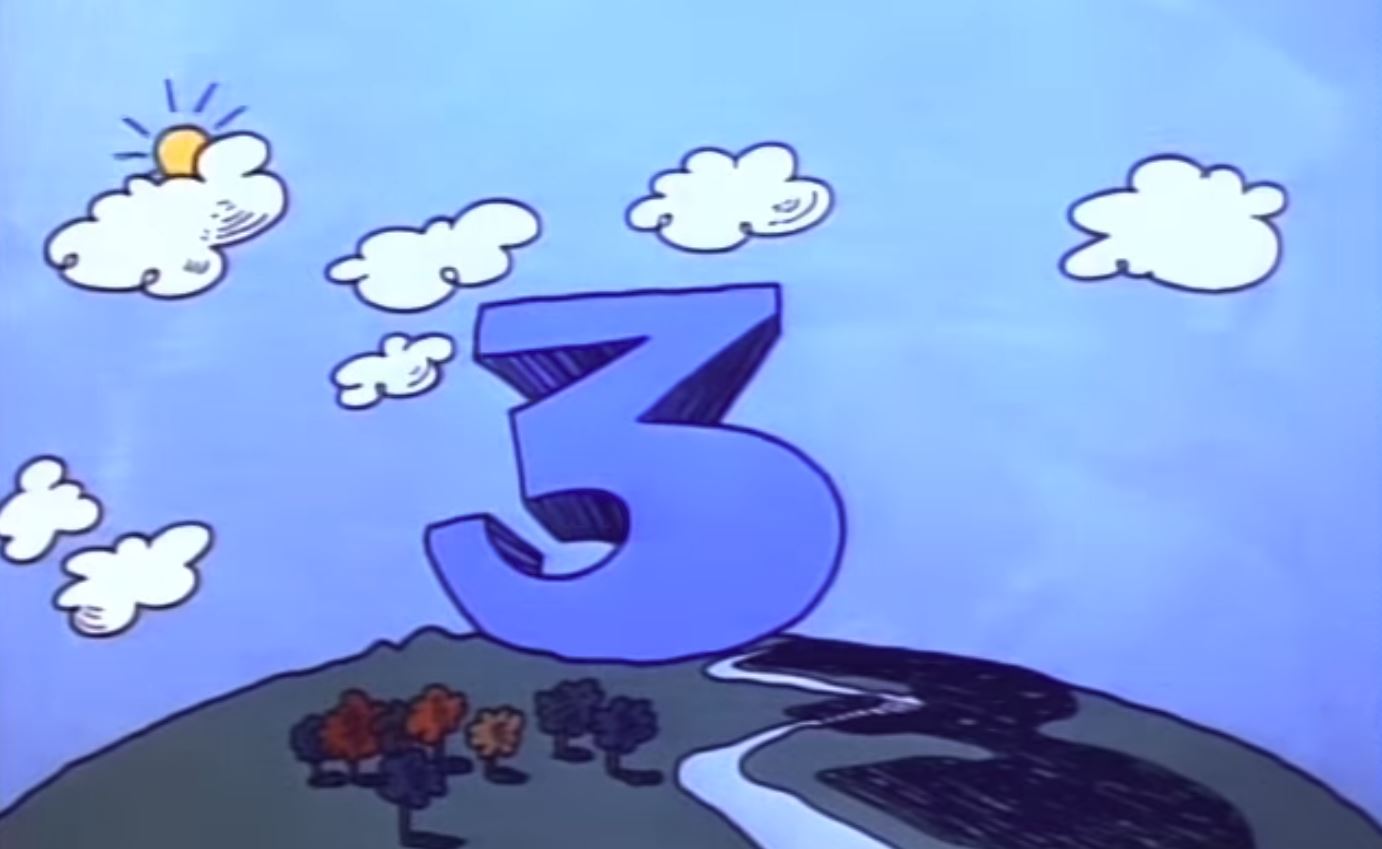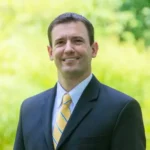Boise, ID. As a boy, Saturday mornings helped to teach me civics (“I’m Just a Bill”), the rules of English (“Conjunction Junction”) and my multiplication tables.“Three, It’s a Magic Number” was the first of many Schoolhouse Rock! songs to appear on ABC television during the 1970s and 80s. Singer-songwriter Bob Dorough was somehow able to make “3, 6, 9, 12, 15, 18, 21, 24, 27, 30” into a catchy chorus. Other cultural norms came along for free in the verses.
Among those were religious references that would seem shocking today: “Somewhere in the ancient mystic Trinity, you get three as a magic number.” Even in 1971, this was apparently too shocking to animate. So, we kids saw a lightning bolt that did little to advance the “three” theme but avoided anyone having to draw the Father, Son, and Holy Spirit. Similarly, “Faith, and Hope, and Charity” became three young girls (but at least they were prayerful).
Thankfully there was yet no need for dodgy drafting when it came to family formation. “A man and a woman had a little baby. Yes, they did. They had three in the family, and that’s a magic number.” The happy trio was portrayed as described and would even close out the song.
The early 1970s were far from a time of sexual purity. The counter-culture was still proclaiming “free love,” the Stonewall uprising had invigorated the gay rights movement, Deep Throat was about to bring pornography more into the mainstream, and Studio 54 was soon to become a celebrated den of drugs and debauchery. Nevertheless, there were still some protective lines around childhood. Story time at the local library never involved cross-dressing, and The Brady Bunch was the most out of the ordinary family unit portrayed on television.
Today’s children are provided no such relative clarity. Known in my youth for their prodigious use of green slime on You Can’t Do That on Television, Nickelodeon now helps the kiddos count to 10 with the help of an animated drag queen. On the preschool outlet Nick Jr., the long running show Blues Clues embraces the rainbow with a sing-a-long song for Gay Pride Month.
First up in “the big parade” is a family that “has two mommies, they love each other so proudly.” Next, “this family has two daddies.” (They are bears as it turns out.) It only gets more diverse from there on. “Non-binary,” “trans,” “ace,” “bi,” “pan,” “kings and queens,” and “allies to the queer community,” all have their floats amid a kaleidoscope of LGBT+ symbology.
The one apparently straight example in this parade of “families” is an owl couple that get no descriptive lyrics and bring up the rear of the parade. Oddly, the heterosexual duo is presented as childless while little ones abound on most other parade floats. The female owl appears to be wearing a head scarf and both are, of course, adorned in rainbow regalia. For Nickelodeon, “all families are made differently” but none resemble the trio in “Three, It’s a Magic Number.”
The animated drag queen serving as grand marshal for the Blues Clues parade is voiced by Nina West, a former Miss Congeniality from the series RuPaul’s Drag Race who was named Andrew Levitt when born in 1978. West in the flesh also explains the Pride flag for the young audience in another video. “Doesn’t it just fill you with pride, showing who you are on the inside! With the Pride flag up high, be true to you.”
Truth is the heart of the matter. If sexuality is truly defined by dozens of genders and expressions, then as West told EW.com the motivation that “LGBTQIA+ families deserve a safe space to raise their children and celebrate their individuality and grow without fear” is a noble one. If some or all of the alphabet soup is a deviation from an actual objective reality, however, then this year’s flood of rainbow pride is what the prophet Isaiah described as a reason for woe: “Woe to those who call evil good and good evil, who put darkness for light and light for darkness, who put bitter for sweetand sweet for bitter.”
Isaiah’s woe is based on the idea that words have meaning and that the subversion of meaning is a cause for lamentation and correction. The point of that first Schoolhouse Rock! was to teach a knowable and defined multiplication table. For Nickelodeon, however, “family” becomes a matter of will with infinite possibilities. Even the old adage that you can’t choose your family is taken head-on. “Some people choose their family,” West instructs as a float featuring three species passes by. The actual animal kingdom, while presenting variations on heterosexuality from lifelong couples to harems, provides little support for the images in the videos.
The animals are not included for the sake of accuracy, of course, but for the sake of drawing the attention of young eyes. “Come join the fun!” the little ones watching Blues Clues are told. “Love is love is love you see,” but that unintended lesson in the art of the tautology is as close to educational as it gets.
Nevertheless, the chorus joining in with West is a large one. The NFL wants you to know that “Football is gay. Football is lesbian.” My social media has also shown the logos for everything from The Nature Conservancy to Sensodyne toothpaste and the Michigan State Spartans going rainbow. Alaska Airlines, which until 2012 offered biblical prayer cards with its meals (but halted the practice to avoid offending some), has colorfully painted an Airbus so it can always “Fly with Pride.”
The rainbow is, contrary to the ark story with which it was most associated when I was young, now flooding the world. Children today know it best as a symbol of sexuality rather than a promise of God’s mercy. Yet, a bit like Noah, there are still those going against the tide of the culture. Writer Rod Dreher looks at West’s work and laments, “I am starting to no longer recognize my country.” He is certainly not alone, but sharing that viewpoint can sometimes leave one on feeling like an island amid the recent deluge of pride.
For those who still stand by the essential limiting power of words, these are trying times. In an age when homosexuality is immutable but gender is fluid, things can get a bit confusing. Dorough’s original vision, though, has retained cultural relevance for decades. The rock group Blind Melon covered “Three is a Magic Number” for a popular 1996 tribute album, and in 2013, I was among thousands that came to hear Dorough sing his greatest kiddie hits at the Kennedy Center. There, a former employee of the agency behind Schoolhouse Rock! shared the story of how the line “a man and woman had a little baby” helped to cinch the deal. Whether that sort of threesome can still survive as a magic number in the culture of 2021 is very much an open question.







9 comments
Martin
The small irony here is that “homo-sexual” means NOT diverse, but “attracted to the same sex.”
The big irony is that “enlightened” people railing against religion are more and more starting to spout certainties that sound like religious dogmas: “the arc of history inevitably progresses humanity toward a predetermined, already-known state of better morality.” This is precisely the tune of people who support sharia or other strict interpretations of morality based on religion.
As for pride, I recall some 50 years ago when my social studies teacher in high school pointed out the difference between tolerance and acceptance. In a nutshell, the former means you merely refrain from attacking someone who is different, but the latter means you actually invite the person to dinner at your home.
However, there’s a third dimension, blithely ignored by virtue signalers in their early 20s, fresh from learning the “ultimate moral compass” from teachers. Beyond acceptance is something we might call aspiration. Sarah Jessica Parker, playing a conservative businesswoman in the 2005 movie Family Stone, voiced it in a dinner encounter in the script. I’ll paraphrase:
One might ask a young couple, “How many boys and girls do you want?” and they would likely answer a number of each. One might ask a young couple, “Do you want your kids to grow up to be artists, scientists, sports professionals, etc?”
But if you ask a young liberal couple, “How many of your children do you want to be gay and how many straight?” I think you will tap into some discomfort that underlies all the obligatory parading of virtue. Try it.
Rob G
“society is progressing in its march away from any biological-based family units”
This has been on the agenda of many radicals and egalitarians since day one of their “movement.” In our day it does not take the form of direct attack, so often as it does an undermining by expansion and redefinition. After all, if you can define “family” any way you please, ultimately the word means nothing: explaining becomes explaining away.
The supposed end game is the removal of one of the last roadblocks on the golden highway to Progress™, but whether the perpetrators realize it or not is really the elimination of the most important buffer between the individual and the state. “Families” that can be assembled and disassembled at will can hardly serve as bulwarks, and the state knows this.
John Murdock
Thanks, everyone for your comments. Rob, I like your point about the problems of “woke capitalism.” Of course, while I do, not everyone looks and sees a two-headed dragon. That differing assessment is at the heart of Russell Arben Fox and my disagreement. While folks like Dreher and myself see a rainbow dragon, RAF and others see a harmless unicorn. So, I suspect the debate is unavoidable.
Rebekah, fine points about the sloppy songwriting. While Schoolhouse Rock was fueled by creative originals, our decadent (in the sense that Ross Douthat has used the word) society can’t even rip off an existing tune in a logical manner. That the original is a Civil War song is interesting. Knowingly or not, it is being used as something of a triumphant march by the LGBT army.
Brad, thanks for noting the other big jaw dropper for Pride Month 2021. I probably should have included that in the piece. Before long, one suspects that the long running rumors about Bert and Ernie will become an actual storyline on the show.
Leslie, you make the classic “there were lots of crazy things happening in Bible times, so why take that book seriously” argument. I would challenge you to investigate whether things ever go well with polygamy or related sexual ethics in the Bible (e.g. Sarah and Hagar or Rachel and Leah). While the practice is at times present, my read is that it was not the original plan from Genesis (i.e. Adam and Eve not Adam + Eve + sister-wives, and of course no Steve in the mix either) and the deviations from the one man/one woman scenario are never commended by God. I’m really perplexed why you “suspect” that Isaiah would be against the biological union of man and woman from “Three, It’s a Magic Number.” I’ve actually read Isaiah (though not recently) and that was not my take. The “things are always changing” argument seems to me a way to avoid drawing any lines while actively erasing the ones that exist. Of course, you are far from alone in your view that society is progressing in its march away from any biological-based family units, as the Blues Clues parade makes clear.
Thanks to all for reading and commenting.
Leslie Forsyth
Family life and structures have changed and evolved throughout human history. When the prophet Isaiah was pontificating, polygamy was commonplace, women were chattels, and many children were required. I suspect Isaiah would have had issues with the family structure you appear to find virtuous.
Brad
Thanks John. I was recently gob-smacked upside the head when Sesame St featured two husbands in a spot celebrating Pride. I don’t know who sits on the Oversight Board or whatever of PBS but they want to be woke and endoctrinate an entire generation of viewers. As a parent I have to be selective of what we watch. I personally like NPR but can’t be on the other side of the room lest they invariably work the rainbow agenda into just about any story you care to name
Rebekah
Let’s focus on what’s important. Blues Clues ought to fire its incompetent writers for their lazy, unreflective lyrical ineptitude.
–Families are described as marching ZxZ when in fact they all proceed in single file. (Would give credit here for sly rhetorical reference to “When Johnny Come Marching Home,” in which “We’ll all feel gay,” but kids haven’t learned that song for decades so it’s useless. They think it’s about ants.)
–McGonagall level metrical failure.
–Even McGonagall knew how to end rhyme. Someone at Blues Clues got paid to rhyme “mommies” and “daddies” with “proudly.”
Sad!
Rob G
Very telling exchange here, as just yesterday I was thinking, on the basis of a recent Dreher post, that may be precisely where the dialogue between “left” and “right” Porchers will break down.
For the thing to work the lefties have to back off on cultural liberation while we on the right have to back off on “economic liberty.” Dreher argues that that will be harder for the left than for the right, since no one on the right will be “cancelled” for rejecting market fundamentalism and corporate cheerleading, but on the left there’s a price to be paid for criticizing wokeness. I think he is right, generally speaking.
Jeff Martin, who used to blog in various places as “Maximos,” once wrote,
“The left wants economic solidarity while preaching cultural liberation, but the latter subverts the former. The right wants traditional morality while preaching economic liberty, but the latter subverts the former.”
To put this another way, “woke capitalism” is problematic in both its adjective and its noun, not just one or the other. And arguing about which is worse is a time-waster. When you’re being attacked by a two-headed dragon, who stops and debates which head is worse?
John A Murdock
Russell, always good to have a respectful discussion on the Porch. Please, help me follow the argument, though. You open with a reference to shooting fish in a barrel (i.e. criticizing the Blues Clues Pride Parade is too easy). Thus, I was expecting that you would at least agree that three-year-olds are not an appropriate audience for discussions of sexual topics but then argue that X, Y, or Z aspect can’t be dismissed simply because Nickelodeon made some bad propaganda. Yet, you end up defending “early recognition of lifestyles outside the norm.” So, are these videos aimed at pre-schoolers good things in your view or not?
And I don’t follow the guilt by association with MTG either. She (with whom I disagree on QAnon and, I suspect, much more) may agree with me here that the videos are problematic, and she also probably still believes that the world is round. I’m not going to defend the videos or join the Flat Earthers just to be on the opposite side of her. If the argument is that I’m simply “nut-picking” (plucking out the isolated worst to make it look emblematic of all) like MTG would, I’m happy to see your list of those on the pro-LGBT side who have called out Nickelodeon. While jarring, the videos do seem rather emblematic of the Pride flood and I included other examples too along with my 1971 apples to 2021 apples cartoon comparison.
Regarding the argument that personal experiences should drive our perceptions, I’ll note that I do have extended family members who identify with various letters in the LGBT acronym (including one with the “T”—though quite distant). I wish them all the best, but I don’t believe those decisions are the best for them because here I believe other authority sources are more accurate than their personal perceptions.
I’m always open to more data, though, and my goal is to get as close to the truth as possible, acknowledging that we all stumble through our own histories and biases along the way. Thanks for engaging.
Russell+Arben+Fox
Wonderfully written, John, as always, but, in my judgment, you’re engaging in a little too much shooting of barrel-fish here. Making use of corporate YouTube channels so as to engage in arguments for or against gender fluidity isn’t quite on the level of a weekly Bible-study session of the collected statements of Marjorie Taylor Greene, but it’s getting there. Perhaps plan on checking back in a few years when your niece transitions, as mine did, with marvelously positive consequences for his prior long-time psychological and spiritual struggles, and for his educational and work accomplishments since then. The conversation about the validity of an early recognition of lifestyles outside the norm might go slightly differently then.
Comments are closed.